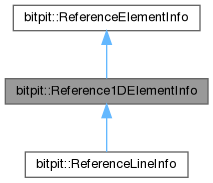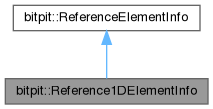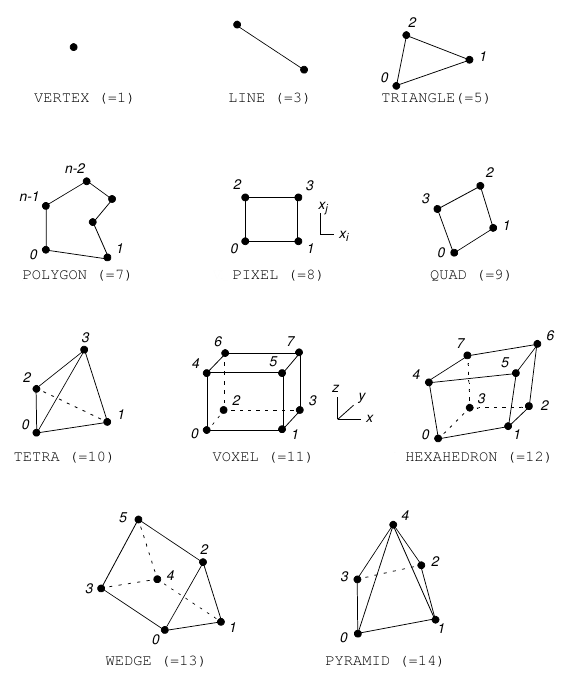The Reference1DElementInfo class allows to define information about reference one-dimensional elements. More...
Inheritance diagram for bitpit::Reference1DElementInfo:

Collaboration diagram for bitpit::Reference1DElementInfo:

Public Member Functions | |
| virtual double | evalLength (const std::array< double, 3 > *vertexCoords) const =0 |
| virtual std::array< double, 3 > | evalNormal (const std::array< double, 3 > *vertexCoords, const std::array< double, 3 > &orientation={{0., 0., 1.}}, const std::array< double, 3 > &point={{0.5, 0.5, 0.5}}) const =0 |
 Public Member Functions inherited from bitpit::ReferenceElementInfo Public Member Functions inherited from bitpit::ReferenceElementInfo | |
| virtual double | evalPointDistance (const std::array< double, 3 > &point, const std::array< double, 3 > *vertexCoords) const =0 |
| virtual void | evalPointProjection (const std::array< double, 3 > &point, const std::array< double, 3 > *vertexCoords, std::array< double, 3 > *projection, double *distance) const =0 |
| virtual double | evalSize (const std::array< double, 3 > *vertexCoords) const =0 |
Protected Member Functions | |
| Reference1DElementInfo (ElementType type) | |
 Protected Member Functions inherited from bitpit::ReferenceElementInfo Protected Member Functions inherited from bitpit::ReferenceElementInfo | |
| ReferenceElementInfo (int _dimension, ElementType _type, int _nVertices, int _nFaces, int _nEdges) | |
| ReferenceElementInfo (ReferenceElementInfo const &)=delete | |
| void | initializeFaceEdges (const std::vector< const ReferenceElementInfo * > &facesInfo, const std::vector< const ReferenceElementInfo * > &edgesInfo) |
| ReferenceElementInfo & | operator= (ReferenceElementInfo const &)=delete |
Additional Inherited Members | |
 Static Public Member Functions inherited from bitpit::ReferenceElementInfo Static Public Member Functions inherited from bitpit::ReferenceElementInfo | |
| static BITPIT_PUBLIC_API const ReferenceElementInfo & | getInfo (ElementType type) |
| static bool | hasInfo (ElementType type) |
 Public Attributes inherited from bitpit::ReferenceElementInfo Public Attributes inherited from bitpit::ReferenceElementInfo | |
| int | dimension |
| std::array< std::array< int, MAX_ELEM_VERTICES >, MAX_ELEM_EDGES > | edgeConnectStorage |
| std::array< ElementType, MAX_ELEM_EDGES > | edgeTypeStorage |
| std::array< std::array< int, MAX_ELEM_VERTICES >, MAX_ELEM_FACES > | faceConnectStorage |
| std::array< std::array< int, MAX_ELEM_FACES >, MAX_ELEM_FACES > | faceEdgeStorage |
| std::array< ElementType, MAX_ELEM_FACES > | faceTypeStorage |
| int | nEdges |
| int | nFaces |
| int | nVertices |
| ElementType | type |
 Static Public Attributes inherited from bitpit::ReferenceElementInfo Static Public Attributes inherited from bitpit::ReferenceElementInfo | |
| static BITPIT_PUBLIC_API const int | MAX_ELEM_EDGES = 12 |
| static BITPIT_PUBLIC_API const int | MAX_ELEM_FACES = 6 |
| static BITPIT_PUBLIC_API const int | MAX_ELEM_VERTICES = 8 |
Detailed Description
The Reference1DElementInfo class allows to define information about reference one-dimensional elements.
The local numbering scheme of element vertices is shown below.

Definition at line 292 of file element_reference.hpp.
Constructor & Destructor Documentation
◆ Reference1DElementInfo()
|
protected |
Constructor
- Parameters
-
type is the type of element
Definition at line 1671 of file element_reference.cpp.
Member Function Documentation
◆ evalLength()
|
pure virtual |
Implemented in bitpit::ReferenceLineInfo.
◆ evalNormal()
|
pure virtual |
Implemented in bitpit::ReferenceLineInfo.
The documentation for this class was generated from the following files:
- src/patchkernel/element_reference.hpp
- src/patchkernel/element_reference.cpp
 1.10.0
1.10.0